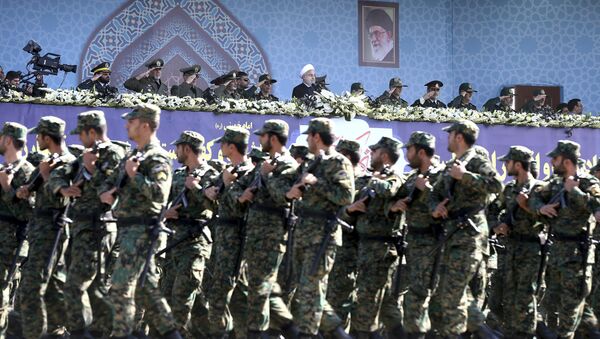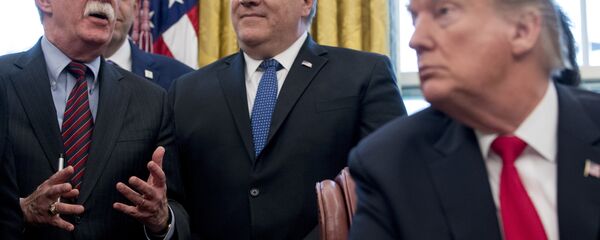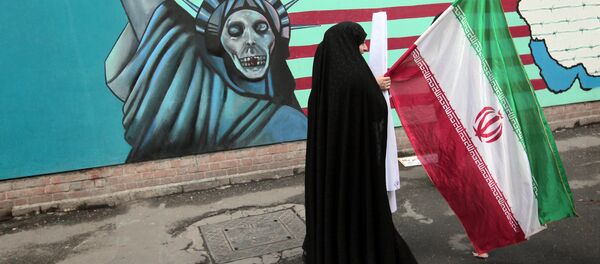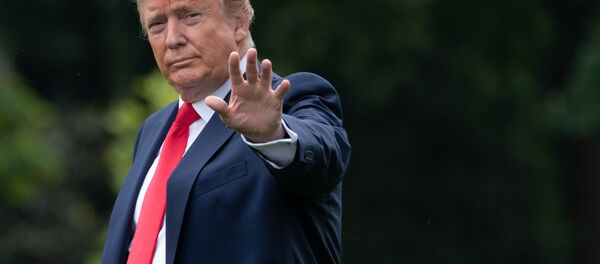It appears that Donald Trump and his administration's officials are using his "North Korea playbook" in Washington's current relations with Iran, a CNN analysis suggested amid the US military build-up in the Middle East.
However, Richard Murphy, former assistant secretary of state for Near Eastern and South Asian Affairs and former US ambassador to Syria, points out that the Trump administration's strategy has yet to yield tangible results.
"President Trump's 'playbook' with North Korea initially succeeded in persuading the North Korean President to meet, but has yet to yield progress on the substance of nuclear disarmament", Murphy highlighted, referring to Pyongyang's speedy return to its missile tests as a signal that the Democratic Republic of North Korea (DPRK) is determined to get "a better American offer on lifting sanctions" before making any concessions.
According to the former official, the conditions for Tehran and Pyongyang, laid out by Secretary of State Mike Pompeo and National Security Advisor John Bolton, are probably seen by those countries "as signalling minimal US interest in the compromises of serious diplomacy".
Meanwhile, in contrast to North Korea, which remains largely isolated by the international community, the Islamic Republic of Iran has continued to maintain cooperation both with Asian giants and EU major powers and signatories to the 2015 Joint Comprehensive Plan of Action (JCPOA) who signalled their commitment to the nuclear deal after Trump tore it apart in May 2018.
"Iran has many more supporters than those sympathetic to North Korea", Murphy noted. "They include long-term American allies who disagreed with the American withdrawal from the JCPOA last year and are trying to find ways to lessen the increasing weight of American sanctions on Iran".
In early May, the US deployed B-52 Stratofortress bombers, the Abraham Lincoln Carrier Strike Group, a Patriot missile battery, and the Arlington amphibious transport dock to the Middle Eastern region in a bid to counter a potential threat from Iran. On 25 May, the White House announced that it would send 1500 US troops to the region.
"If Iran wants to fight, that will be the official end of Iran. Never threaten the United States again!" Trump tweeted on 20 May.
If Iran wants to fight, that will be the official end of Iran. Never threaten the United States again!
— Donald J. Trump (@realDonaldTrump) 19 мая 2019 г.
Four Stark Similarities in Trump's Handling of N Korea, Iran Issues
Trump's hardball diplomacy towards Iran evokes strong memories of his war of words with the North Korean leadership over the country's intercontinental ballistic missile tests in 2017, peaking with Pyongyang's vow to launch ballistic missiles into the waters around the US naval base in Guam and the US president's now famous "fire and fury" statement in August 2017.
First, both countries were subjected to tough sanctions over their nuclear programmes. Second, in both cases the Trump administration exercised harsh rhetoric and openly discussed the use of the US military.
Third, Trump relisted North Korea as "state sponsor of terrorism" in November 2017 after it was removed from the US list in 2008. Much in the same vein, in April 2019, Tump designated Iran's Islamic Revolutionary Guard Corps as a foreign terrorist organisation which became the first time that the US has declared an element of a foreign government to be a terrorist entity.
Fourth, in both cases the US resorted to a demonstration of force, beefing up its military presence in the regions. Thus in January and February 2018, the US deployed aircraft carriers and other strategic assets around the Korean Peninsula. Likewise, the Pentagon boosted its positions near the Persian Gulf in May 2019.
Trump's 'Fire-and-Fury' North Korea Strategy That Has Yet to Bear Fruit
Tensions between North Korea and the US escalated steadily from August 2017 to March 2018, accompanied by Pyongyang's weapons tests and Washington's retaliatory measures, including sanctions and the demonstration of military force in the region.
The change in Trump's rhetoric towards the DPRK leader was remarkable, with Kim Jong-un transforming from "little rocket man" into "Chairman Kim".
However, regardless of Trump's stick-and-carrots tactics, Pyongyang quickly returned to its missile tests in mid-May 2019, following the 27 February Trump-Kim summit in Hanoi that ended with the introduction of new sanctions against North Korea.
John Bolton openly denounced Pyongyang's missile test and was labelled by the DPRK as a "warmonger" in response. For his part, Donald Trump downplayed the tests during his visit to Japan: "North Korea fired off some small weapons, which disturbed some of my people, and others, but not me. I have confidence that Chairman Kim will keep his promise to me…"
North Korea fired off some small weapons, which disturbed some of my people, and others, but not me. I have confidence that Chairman Kim will keep his promise to me, & also smiled when he called Swampman Joe Biden a low IQ individual, & worse. Perhaps that’s sending me a signal?
— Donald J. Trump (@realDonaldTrump) 26 мая 2019 г.
For its part, North Korea, apparently, remembers Iran's warning about Washington's alleged inability to deliver on its promises after Trump's unilateral withdrawal from the 2015 nuclear deal.
Time will tell whether Trump's "fire and fury" strategy towards North Korea and Iran will work.
The views and opinions expressed by the speaker do not necessarily reflect those of Sputnik.





